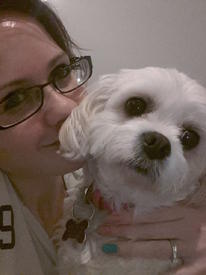Best way of guessing BF%?

kittyd7015
Posts: 4,546 Member
which is the most accurate way of guessing?
0
Replies
-
I find taking tape measurements and using tools here pretty good: http://www.fat2fitradio.com/tools/
Additionally, I also have a handheld electrical device. I use both methods every week to see that both have the overall number going down. As my weight has gotten down, the two methods have gotten closer together in their difference.0 -
I use a BF% calculator that uses measurements like this one: http://www.scientificpsychic.com/fitness/diet.html0
-
0
-
my parents have a scale that reads body fat but i'm very skeptical on its accuracy.0
-
I find taking tape measurements and using tools here pretty good: http://www.fat2fitradio.com/tools/
Additionally, I also have a handheld electrical device. I use both methods every week to see that both have the overall number going down. As my weight has gotten down, the two methods have gotten closer together in their difference.
^^^^ This one has me at 27.8%
vvvv This one has me at 60.3%
http://www.scientificpsychic.com/fitness/diet.html
That's a pretty wide margin =/0 -
bump0
-
Calipars (Done by someone who knows how to use them)
And to get a real good measurement...Have two different people do the measurements0 -
I find taking tape measurements and using tools here pretty good: http://www.fat2fitradio.com/tools/
Additionally, I also have a handheld electrical device. I use both methods every week to see that both have the overall number going down. As my weight has gotten down, the two methods have gotten closer together in their difference.
^^^^ This one has me at 27.8%
vvvv This one has me at 60.3%
http://www.scientificpsychic.com/fitness/diet.html
That's a pretty wide margin =/
Holy cow lol. The Military Body Fat Calculator in my link from fat2fitradio is only different from the electrical impedance hand held device by 0.8%. So, I tend to be pretty happy using both.0 -
I use the tape measure approach. It's not about the actual reading it's about the CHANGE in the reading as continue down this road.
Pick a method and stick with it.0 -
bumping this for that link to use when I get home!0
-
I find taking tape measurements and using tools here pretty good: http://www.fat2fitradio.com/tools/
Additionally, I also have a handheld electrical device. I use both methods every week to see that both have the overall number going down. As my weight has gotten down, the two methods have gotten closer together in their difference.
^^^^ This one has me at 27.8%
vvvv This one has me at 60.3%
http://www.scientificpsychic.com/fitness/diet.html
That's a pretty wide margin =/
Holy cow lol. The Military Body Fat Calculator in my link from fat2fitradio is only different from the electrical impedance hand held device by 0.8%. So, I tend to be pretty happy using both.
Well I think it's because I am "morbidly" obese. I said once before, and it may be true, that once you get so fat, these types of calculators are pretty meaningless. :laugh: (I could be wrong. It's happened before.)
I know that I have a long way to go, so body fat percentage isn't really on my radar. My main thing now is to lose a few more inches to go down a size in clothes! :bigsmile:0 -
It's good that I can help out once in a while...
I have been researching a lot about this subject and I have found couple of good resources that gave me 90% accurate body fat calculations.
The website:
http://www.linear-software.com/online.html
(Method 3 for Males seems to be 90% accurate. I have also tried Female version of the calculator and it also seems right but I can't be sure. Test it yourself ladies.) - ( I have only tried it on myself, I am a male)
I use a body fat caliper to take measurements and enter the amounts in the appropriate boxes and the result was way more accurate than anything else I had tried.
In addition, if you have a body fat percentage in mind, which you aimed to achieve, you can also calculate and find out what your weight have to be in order to achieve that. It certainly makes it easier to make a decision on how far you want to take the weight loss plan. Anyway, here's an example;
If the results show that your current lean weight (in pounds) is 150, your body fat is 20 and you aim to lose enough fat to achieve 10% body fat, you use this method;
Lean Weight / (1 - Targeted body fat percentage) = Result | 150 / (1 - 0.10) = 166.66
Assuming that you won't lose muscle instead of fat, this should somewhat be accurate. But always check up on it. Don't count on me. This was a little something I was also curious about and this is as accurate as it goes.
I hope I helped without angering anybody. 0
0 -
The most accurate results are going to be achieved by having a body composition scan, such as a BodPod/DXA scan, or doing a water displacement test.
The issue here is that these are all expensive, inconvenient, uncomfortable and/or not readily accesible.
I just use calipers.0 -
I'm pleased with my Omron handheld device. Although bioelectrical impedance analysis is often criticized as being inaccurate, it's accurate enough, or at least consistently inaccurate over time, so as to make the trend clear.0
-
It's good that I can help out once in a while...
I have been researching a lot about this subject and I have found couple of good resources that gave me 90% accurate body fat calculations.
The website:
http://www.linear-software.com/online.html
(Method 3 for Males seems to be 90% accurate. I have also tried Female version of the calculator and it also seems right but I can't be sure. Test it yourself ladies.) - ( I have only tried it on myself, I am a male)
I use a body fat caliper to take measurements and enter the amounts in the appropriate boxes and the result was way more accurate than anything else I had tried.
In addition, if you have a body fat percentage in mind, which you aimed to achieve, you can also calculate and find out what your weight have to be in order to achieve that. It certainly makes it easier to make a decision on how far you want to take the weight loss plan. Anyway, here's an example;
If the results show that your current lean weight (in pounds) is 150, your body fat is 20 and you aim to lose enough fat to achieve 10% body fat, you use this method;
Lean Weight / (1 - Targeted body fat percentage) = Result | 150 / (1 - 0.10) = 166.66
Assuming that you won't lose muscle instead of fat, this should somewhat be accurate. But always check up on it. Don't count on me. This was a little something I was also curious about and this is as accurate as it goes.
I hope I helped without angering anybody.
99 times out of 100 you will lose lean mass as well as fat, so doing this if you get down to the 166.66 you will most likely be in the 12-13% bf% range. I estimate 1lb lean mass lost for every 5-9 lbs dropped, not factoring this in will usually end up in disappointment.0 -
I find taking tape measurements and using tools here pretty good: http://www.fat2fitradio.com/tools/
Additionally, I also have a handheld electrical device. I use both methods every week to see that both have the overall number going down. As my weight has gotten down, the two methods have gotten closer together in their difference.
^^^^ This one has me at 27.8%
vvvv This one has me at 60.3%
http://www.scientificpsychic.com/fitness/diet.html
That's a pretty wide margin =/
Are you sure you entered your information correctly? The first tool had me at 26% BF, the second at 27.2%. I had never tried this kind of online measuring tool before - it definitely was worth breaking out the tape measure!0 -
Pony up for a DEXA scan. It's one of the most accurate methods out there. http://en.wikipedia.org/wiki/Dual-energy_X-ray_absorptiometry0
-
I have an Omron scale that measures not only body fat but visceral fat also. IT costs about $70.0
-
Bump!0
-
I use a BF% calculator that uses measurements like this one: http://www.scientificpsychic.com/fitness/diet.html
Using this I get:
Body Mass Index: 25.8 kg/m2
Waist-to-Height ratio: 0.44
Percent Body Fat: 29.8%
Lean Body Mass: 110.2 lb
Your BMI is greater than normal, but your waist-to-height ratio is normal.
You may be overweight or have unusual mass distribution.
Your diet should contain at least 55 grams of protein per day.
Unusual mass distribution... what's that even mean.... I'm a pear shape....0 -
saving this for later. i know nothing about this. thanks for the info!It's good that I can help out once in a while...
I have been researching a lot about this subject and I have found couple of good resources that gave me 90% accurate body fat calculations.
The website:
http://www.linear-software.com/online.html
(Method 3 for Males seems to be 90% accurate. I have also tried Female version of the calculator and it also seems right but I can't be sure. Test it yourself ladies.) - ( I have only tried it on myself, I am a male)
I use a body fat caliper to take measurements and enter the amounts in the appropriate boxes and the result was way more accurate than anything else I had tried.
In addition, if you have a body fat percentage in mind, which you aimed to achieve, you can also calculate and find out what your weight have to be in order to achieve that. It certainly makes it easier to make a decision on how far you want to take the weight loss plan. Anyway, here's an example;
If the results show that your current lean weight (in pounds) is 150, your body fat is 20 and you aim to lose enough fat to achieve 10% body fat, you use this method;
Lean Weight / (1 - Targeted body fat percentage) = Result | 150 / (1 - 0.10) = 166.66
Assuming that you won't lose muscle instead of fat, this should somewhat be accurate. But always check up on it. Don't count on me. This was a little something I was also curious about and this is as accurate as it goes.
I hope I helped without angering anybody. 0
0 -
I use that site also - the JP/3 (3-site) method with skinfold calipers. In an effort to make it as accurate as possible, I measure each site 10 times (rotating through the sites), then average them. The results seem to be very consistent with visual estimation, based upon measured reference photos. Even if it may not be perfectly accurate, it's consistent and makes for a valid ongoing comparison.It's good that I can help out once in a while...
I have been researching a lot about this subject and I have found couple of good resources that gave me 90% accurate body fat calculations.
The website:
http://www.linear-software.com/online.html
(Method 3 for Males seems to be 90% accurate. I have also tried Female version of the calculator and it also seems right but I can't be sure. Test it yourself ladies.) - ( I have only tried it on myself, I am a male)
I use a body fat caliper to take measurements and enter the amounts in the appropriate boxes and the result was way more accurate than anything else I had tried...0 -
Mirror, hydrostatic test or a DEXA scan.
http://www.myfitnesspal.com/topics/show/830595-body-fat-estimation-methods0 -
I use body fat percentage scales. While I know this is not the most accurate way, I am not comparing to anyone else but myself. Therefore it is pretty accurate just to track progress. As long as I see that percentage go down, I am happy!0
-
I use body fat percentage scales. While I know this is not the most accurate way, I am not comparing to anyone else but myself. Therefore it is pretty accurate just to track progress. As long as I see that percentage go down, I am happy!
I have scales too. Cant think of anything worse squeezing my fat in between calipers.....at the moment. Once I get lean then I'll purchase some calipers0 -
I plug my measurements into an online calculator and take the average of that and what my bf scale tells me. As long as I have any number to lower, I'm happy.0
This discussion has been closed.
Categories
- All Categories
- 1.4M Health, Wellness and Goals
- 398.1K Introduce Yourself
- 44.7K Getting Started
- 261K Health and Weight Loss
- 176.4K Food and Nutrition
- 47.7K Recipes
- 233K Fitness and Exercise
- 462 Sleep, Mindfulness and Overall Wellness
- 6.5K Goal: Maintaining Weight
- 8.7K Goal: Gaining Weight and Body Building
- 153.5K Motivation and Support
- 8.4K Challenges
- 1.4K Debate Club
- 96.5K Chit-Chat
- 2.6K Fun and Games
- 4.8K MyFitnessPal Information
- 12 News and Announcements
- 21 MyFitnessPal Academy
- 1.5K Feature Suggestions and Ideas
- 3.2K MyFitnessPal Tech Support Questions


















